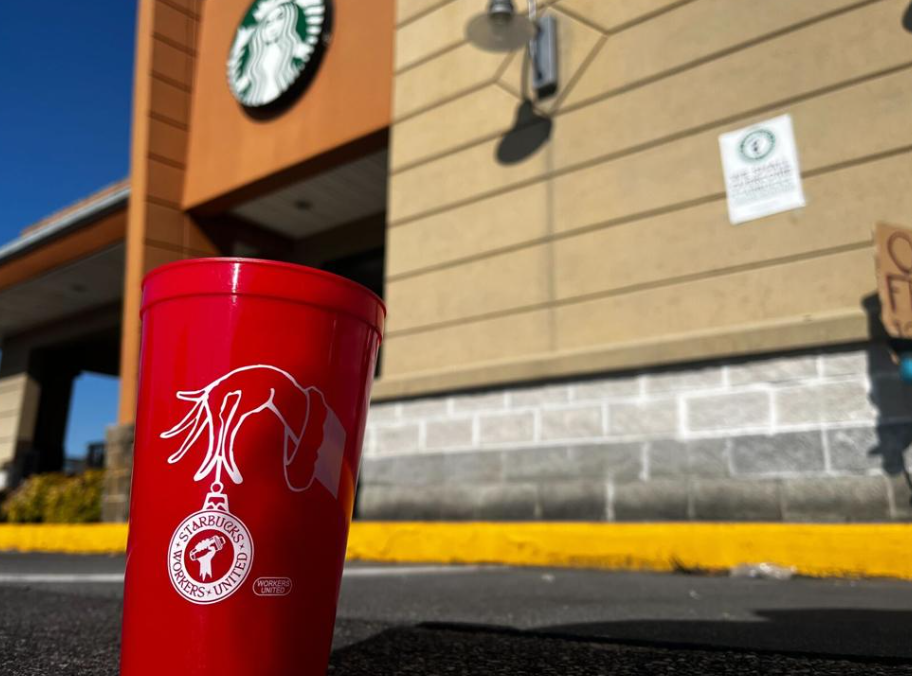In a bold move marking the largest strike in the ongoing efforts to unionize Starbucks stores, workers at more than 200 locations across the United States walked off the job on Thursday. Dubbed the “Red Cup Rebellion” by the Workers United union, the strike coincided with Starbucks’ annual Red Cup Day, one of the busiest days for the coffee giant. Organizers anticipated over 5,000 employees participating in the strike, which included picketing and visits to non-union stores. This comes on the heels of around 30 stores staging walkouts the day before.
The workers’ grievances are multifaceted, ranging from overwork exacerbated by frequent promotions like Red Cup Day to an alleged lack of control over the overwhelming influx of mobile orders. Juniper Schweitzer, a Starbucks employee with 16 years of experience, expressed her frustration, stating, “We just have basically an infinite amount of drinks, and we’re understaffed and underpaid, and we’re sick of it.”
Edwin Palmasolis, a Starbucks employee for over two years, joined the picket line, emphasizing the need for improved working conditions at his Manhattan store. Despite his store voting to unionize last year, bargaining between Starbucks and the union has yet to commence. Palmasolis lamented, “It’s been more of a downgrade than an uphill for us. It’s been exhausting trying to deal with their retaliation, and not much of a change has been made in the past year.”
This strike marks the fifth major labor action by Starbucks workers since the first store in Buffalo, New York, unionized in late 2021. Despite these protests, Starbucks’ fiscal year 2023 revenue reached a record $36.0 billion, a 12% increase. Starbucks reported that many stores with striking workers remained open, staffed by supervisors, managers, and employees who chose not to strike.
The Starbucks unionization effort has been at the forefront of a broader period of labor activism, with strikes occurring among workers at companies like Amazon, auto manufacturers, and within the entertainment industry. Johnnie Kallas, a Ph.D. candidate and project director of Cornell University’s Labor Action Tracker, reported that at least 457,000 workers have participated in 315 strikes in the U.S. in 2023 alone.
Starbucks has consistently opposed the unionization efforts, with no labor agreements reached with stores that have voted to unionize. The process has been marked by contention, including 111 complaints against Starbucks for unfair labor practices, issued by regional offices of the National Labor Relations Board. Starbucks contends that Workers United is refusing to schedule bargaining sessions. Notably, Starbucks has initiated bargaining with the Teamsters union, which organized a store outside of Pittsburgh in June 2022. However, the two sides have not reached a labor agreement.
Tensions between Starbucks and Workers United have escalated, with the recent exchange of lawsuits. Starbucks sued Workers United, claiming that a pro-Palestinian post on a union account damaged its reputation and demanding the union stop using the name Starbucks Workers United. In response, Workers United filed its own lawsuit, alleging defamation by Starbucks for suggesting the union supports terrorism and violence.
As the “Red Cup Rebellion” unfolds, the future of Starbucks’ relationship with its workers and the broader labor movement remains uncertain. The growing wave of labor activism in the U.S. indicates a shifting landscape where workers are increasingly asserting their rights and demanding better working conditions.
(Source: Dee-Ann Durbin | Associated Press | Santul Nerkar | NYT)









